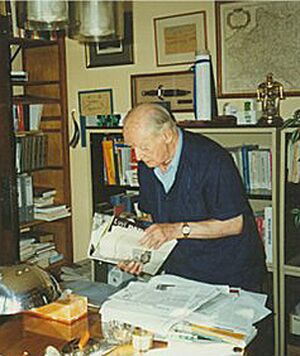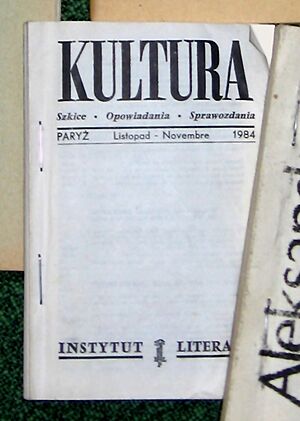Jerzy Giedroyc facts for kids
Quick facts for kids
Jerzy Giedroyć
|
|
|---|---|

Giedroyć in 1997
|
|
| Born | 27 July 1906 Minsk, Russian Empire |
| Died | 14 September 2000 (aged 94) Maisons-Laffitte, France |
| Resting place | Le Mesnil-le-Roi |
| Language | Polish |
| Nationality | Polish |
| Alma mater | University of Warsaw |
| Genre | Publicist |
| Subject | Politics and Literature |
| Literary movement | Independence |
| Notable works | Editor Kultura |
Jerzy Władysław Giedroyc (born July 27, 1906 – died September 14, 2000) was an important Polish writer, lawyer, and political activist. He was also a publicist, which means he wrote articles and essays to share his ideas. For many years, he was the editor of a very important magazine called Kultura. This magazine was published in Paris, France.
Contents
Jerzy Giedroyc's Early Life
Jerzy Giedroyc was born in Minsk on July 27, 1906. His family was a noble Polish-Lithuanian family. This means they had a special historical title.
His schooling in Moscow was stopped by the October Revolution. This was a big historical event in Russia. After that, he returned to Minsk. During the Polish–Soviet War (1919–1921), his family moved from Minsk to Warsaw. There, he finished his studies at the Jan Zamoyski gymnasium in 1924. He then went on to study law and Ukrainian history and literature at the University of Warsaw.
Jerzy Giedroyc's Career and Kultura Magazine
Jerzy Giedroyc worked as a journalist and a government worker in Poland before World War II. He believed it was important for Poland to have good relationships with its minority groups. He especially wanted the Roman Catholic Church to get along better with the Ukrainian Greek Catholic Church. Many Ukrainians belonged to this church.
He felt that Poland would be stronger if it respected the wishes of its minority groups. This way, these groups would not feel the need to argue against Poland being an independent country. He supported Józef Piłsudski's ideas on this matter.
In 1930, he became the editor of a weekly newspaper called "Dzień Akademicki." He soon changed it into a biweekly paper called "Bunt Młodych." In 1937, he renamed it Polityka.
During World War II, Jerzy Giedroyc served in the Polish Army under General Władysław Anders. He made sure to keep good relationships with people from other countries and backgrounds. After the war, he moved to Paris, France.
In Paris, he started and edited a very important Polish magazine called Kultura. This magazine was published from 1947 to 2000. Kultura was a leading magazine for Poles living outside of Poland. It talked about literature and politics.
The magazine promoted the idea of peaceful borders for Poland in the east. It accepted the new borders that were set after the war. Many Poles found these new borders difficult to accept. However, Giedroyc's work helped create a good plan for Poland's relationships with its eastern neighbors after communism ended. His close friend, Juliusz Mieroszewski, helped explain why Poland should accept these borders. Mieroszewski even predicted that Ukraine, Belarus, and Lithuania would become independent countries long before it happened.
Later Life and Remembrance
Jerzy Giedroyc passed away from a heart attack on September 14, 2000. He died in Maisons-Laffitte, France.
In 2006, the Polish Sejm (which is like Poland's parliament) declared that year the "Year of Jerzy Giedroyc." This was to honor his important work and contributions.
Awards and Honours
Jerzy Giedroyc received many awards and honors throughout his life:
- Order of the Crown of Romania, Romania (1930)
- Order of the White Star, Estonia (1932)
- Order of the Crown, Belgium (1938)
- Honorary degree from the Jagiellonian University, Poland (1991)
- Kisiel Prize, Poland (1992)
- Order of the White Eagle, Poland (he did not accept this one, 1994)
- Legion of Honour, France (1996)
- Order of the Lithuanian Grand Duke Gediminas, Lithuania (1998)
- Order of Merit, Ukraine (1998)
See also
- Giedroyc Doctrine
- Jerzy Giedroyc Literary Award
 | Stephanie Wilson |
 | Charles Bolden |
 | Ronald McNair |
 | Frederick D. Gregory |


